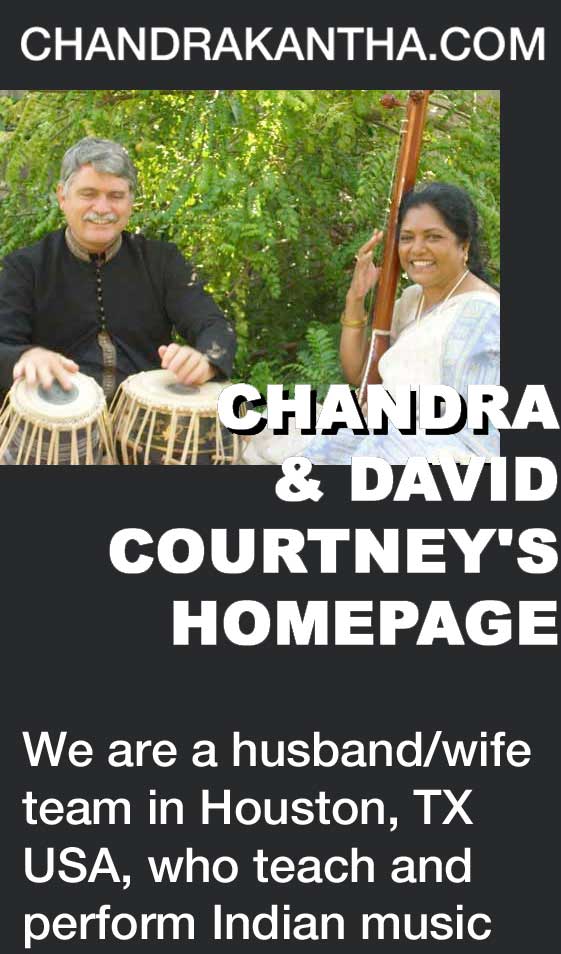| This article originally appeared in the December 1996 issue of New Twain Magazine, Vol 1, Issue 6, December 1996, page 6-18. It was written by Ameer Zadi. |
|---|
by Ameer Zadi
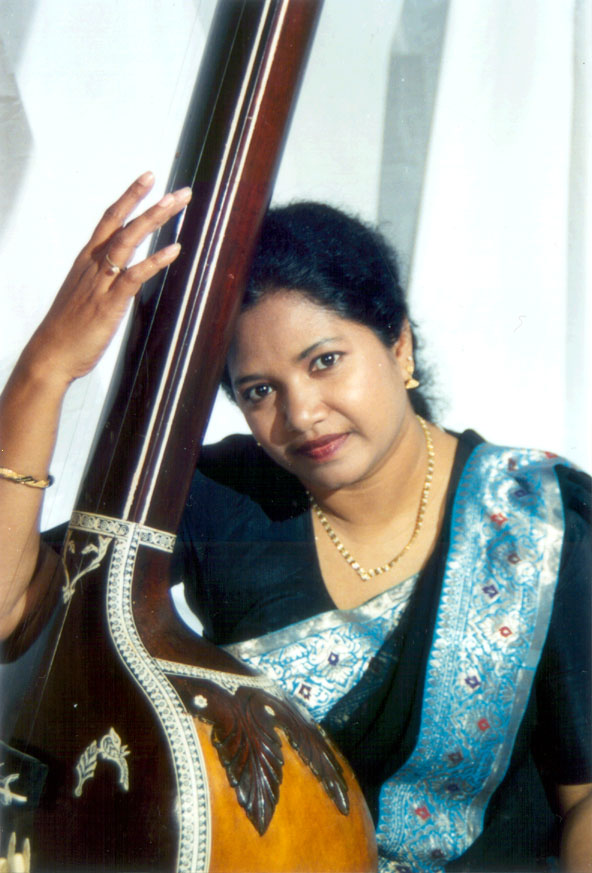
TWAIN – Your full name is Chandrakantha Nada Courtney. Is there something I can call you for short?
CHANDRA – You can call me Chandra, that is what everybody calls me.
| This book is available around the world |
|---|
Check your local Amazon. More Info.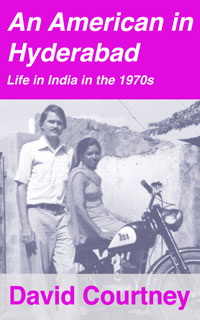
|
TWAIN – Over the years you have started to make a name for yourself. How do you see yourself?
CHANDRA – I see myself both as an artist and an educator.
TWAIN – Tell me something about yourself as an educator.
CHANDRA – Well I spend about 5 months out of each year traveling around the US teaching and performing. David, that’s my husband, goes with me and teaches tabla while I teach North Indian vocal. We have students scattered all over the US so it keeps us busy.
TWAIN – How are you able to handle this?
CHANDRA – We usually go into a city and stay for anywhere from a few days to a few weeks. In this period we have classes daily. It is very intense but it seems to work quite well.
TWAIN – Where have you conducted these classes?
CHANDRA – Numerous cities in Florida, Illinois, Arkansas, Tennessee, Texas and Mississippi.
TWAIN – I understand that you use a textbook. Did you write it?
CHANDRA – Yes, the book is entitled “Elementary North Indian Vocal” and it was jointly written by myself and my husband. It is very convenient; the student doesn’t have to waste time writing everything down because it is already there. The book also covers a lot of theoretical and historical matter, this frees me to concentrate on practical material.
TWAIN – That is fine for your activities as a teacher but you also see yourself as an artist, can you elaborate upon this?

CHANDRA – Oh, I travel around extensively giving performances.
TWAIN – Where are some of the places you have performed?
CHANDRA – Well I gave a lot of performances in India. I used to be a regular artist in All India Radio and Doordarshan, that’s the Government run television network. I have also given performances in Malaysia, Singapore, South Africa, Germany, and of course the United States.
TWAIN – Tell us about your experiences in these counties. How are the audiences compared to the US or India.
CHANDRA – Well the most interesting for me was my trip to South Africa. This was back in 1976 during the time of apartheid. The Indian Government was not allowing people to visit there; however I was allowed to go as part of a special government cultural delegation. This was my first time abroad and it made quite an impact upon me. We were given royal treatment. Since no private artistic groups were allowed to travel to South India the local Indian population was starved for some desi culture. And since we were part of an official delegation we got every official consideration possible.
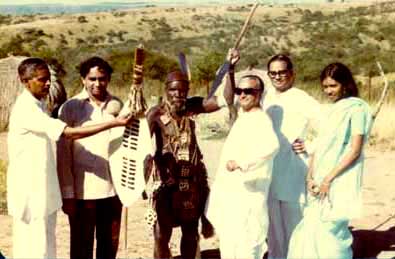
TWAIN – How about the response in other countries?
CHANDRA – Well Singapore and Malaysia were interesting. These countries have a sizable Indian population and we were very well received. However I think that the time I spent in Germany was one of the most interesting.
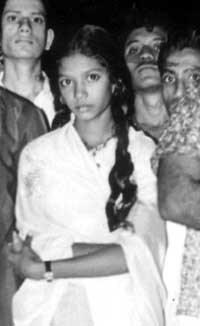
TWAIN – Why was Germany so interesting?
CHANDRA – I have gotten used to performing before communities of Indian expatriates but Germany has a negligible Indian population. These audiences are mainly German. In some ways it is very nice but in other ways it takes some getting used to.
TWAIN – What is different about a German audience?
CHANDRA – Well Germans audiences are very disciplined. If the program is scheduled to start at 7:00 then five minutes before the program everybody quietly comes in. There is not the usual desi habit of doing things, you know people wandering in during the performance, talking, and that sort of thing. Everybody sits quietly – too quietly. I am used to a certain amount of feedback from the audience. A simple “Wah Wah” or “Kya Baat Hai” every now in then allows me to gauge my audience. But the Germans sit still, like they are in the middle of church. At first I was thinking that they weren’t enjoying or understanding my music. Then when the program was over they all stood up and applauded so loudly that I took heart. It was only then that I realized that that was just how they are.
TWAIN – Do you think that you will go again.
CHANDRA – Oh yes. Negotiations are underway right now for another European tour sometime in the spring or summer.
TWAIN – Tell me about your early life.
CHANDRA – Well I was born in Macchalipathnam in Coastal Andhra in 1954. My childhood was very ordinary except I used to sing. When I moved to Vijaywada for schooling I began to sing on the radio for the children’s programs. I kept singing all along. Yet I was just a child with no formal musical training. It was obvious that if I were to progress I needed a teacher, so I enrolled in the Government College of Music and Dance and became a disciple of Pandit J, V. Subba Rao. He was a disciple of the late Vinayak Rao Patwardhan. I studied under him for several years until my family moved to Hyderabad.
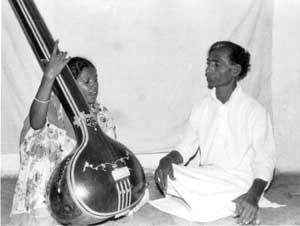
It was in Hyderabad that my career started to take off. During this period I used to work regularly with All India Radio. Later when the first TV station was established I used to perform regularly there. I even did music for a couple of small films.
TWAIN – Did you ever think of going into the film industry?
CHANDRA – I suppose every youngster growing up in India dreams of going into the film field. As a matter of fact, back in the late 60s my father took me to Madras to see if he could get me into the film industry. The South Indian music field was relatively small at that time so we knew people there and they knew me. On one occasion a famous south Indian director, whom I shall not name, was going on about. “Oh yes, leave her here. She has a bright future in this industry. . . .”. A little while later the daughter of a very famous south Indian actress, whom again I shall not name, quietly took my father aside and said “Uncle, you do not know this business. It is filthy business and you should not put someone so young and naive in the hands of these people”. When my father knew the score he got scared and took me away.
TWAIN – You haven’t mentioned any names, is there any reason.
CHANDRA – I knew and still know many people in the industry. S.P. Balasubramanium, Suresh and Ramesh Madhavapeddi, a number of other people. Some of them I have grown up with, so I do not wish to create problems for anybody.
TWAIN – OK so getting back, was that the end of your interest in film music.
CHANDRA – I don’t know, over the years my musical tastes have matured. Today I do not like film music and have very little aspirations to break into the business.
TWAIN – So where are your musical tastes today.
CHANDRA – Today I am mainly interested in classical and semiclassical.
TWAIN – How would you describe your approach to classical music.
CHANDRA – I would say that I try to make classical music accessible. I have been unhappy with the approach of many classical vocalists. They come across as being very arrogant and insensitive to their audiences. I have seen performers who would not even tell what rag they are performing.
There are several things which I do differently. For instance I used to perform Khayals that were over an hour long. Then I realized that times have changed. The audiences of today do not have the patience to sit that long for a single piece. It struck me that if the masters of old could do a khayal within the four minute confines of the old 78 rpm records, then certainly it was possible for me to do justice to a rag in 20 or 30 minutes. Therefore today when I do a khayal it is seldom over 30 or 40 minutes. Another thing that I do is choose my gamaks very carefully. There are many types of gamaks which sound like people gargling or goats bleating. These are done mainly for vocal gymnasics and do not appeal to me on an artistic level. They are unpleasant even to the average Indian audience. I stay a way from these entirely. In a nutshell I would say that if it strikes me as being unpleasant, I will not do it. Even if it is traditionally done, I will not do it.
Another major difference in my performance is that I spend a fair amount of time telling the audience what is happening. I explain a little about rag and tal. I pretend that I am doing it for the Americans in the audience but I realize the many of the Indians don’t know any more about the music than the Americans.
TWAIN – The classical music that you perform revolves heavily around traditional Hindu themes. I understand that you come from an Indian Christian community. Do you have a problem reconciling your religious beliefs with the nature of the music you perform.
CHANDRA – I don’t have any problem at all; I suppose for two reasons.
On one hand a lot of this is merely a question of nomenclature. It doesn’t matter to me whether one refers to God as Jehovah, Allah, Brahma or whatever, to me it is all the same.
On another level, it is a question of culture. The classical music goes back many, many centuries. It is commonly said that the origin of the classical music can be traced to be in the Vedas which were several thousand years before the birth of Christ. If I reject the music outright because of religious differences, I end up cutting myself off from my culture. If one cuts oneself off from ones culture it is like taking a tree and cutting it of at the roots. Within the European tradition, everyone spends a great amount of time studying Roman and Greek mythology. This doesn’t necessarily mean that Europeans are devotees of the pagan deities. This merely means that they are connected with their culture.
Unfortunately there are many within the Christian community in India who are against anything which rings of Hinduism. These unfortunate individuals usually end up with a distorted sense of identity. They cannot entirely escape from their Indian/Hindu roots, yet they have been brainwashed by meddlesome Christian missionaries into believing that these cultural roots are worthless or evil. They therefore waste a lot of emotional energy in the futile attempt to remold their identities after the European missionaries. But these missionaries fail to provide a workable model to which they can turn.
TWAIN – You sound like you have had some uncomfortable experiences in this regard. Is there any event that you would like to talk about?
CHANDRA – There have been very many incidents where my Christian background has been an issue. Both with Christian and Hindus alike.
When I was a child I used to sing gospel songs for a group of Missionaries. They started to give my father a hard time about my singing “Hindu songs”, and claiming that we weren’t “real Christians”. They ended up cutting all relations with me and my family.
There was another event which occurred soon after my marriage. At that time I had a very popular song on the TV. It was a Hindu Devotional song and I sang it because that was my job. A Christian missionary came to visit my mother. He started berating my mother as to why my name is Chandrakantha and not some more appropriate “Christian” name. The he started in about “What kind of daughter” she gave birth to that would sing “Hindu” songs on the TV. It was most disturbing to my mother, for it was none of his business. We didn’t belong to him, he wasn’t a family member or anything. Who was he to come in uninvited and start berating my mother on things that didn’t concern him.
TWAIN – You mentioned that you were married at that time. I understand that your husband is American. How is it that you met?
CHANDRA – This was all at my parents insistence.
TWAIN – This was an arranged marriage?
CHANDRA – Yes, I didn’t even want to get married.
TWAIN – So how did this happen?
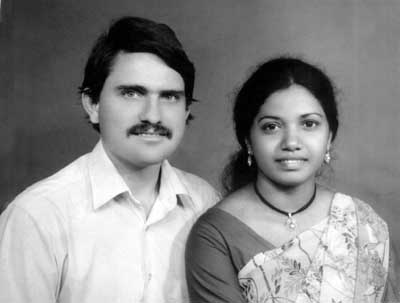
CHANDRA – It was one day in September, I believe it was of 1978 when I was outside playing marbles with the neighborhood children. Even though I was 24, I still acted like a kid. Anyway I was out and my mother was sitting on the steps chatting with some neighbors. It was then we noticed two acquaintances strolling up our lane along with this American boy. Both acquaintances were mature women in their 50s who were producers at all India Radio. One of them was named Vinjamuri Seetha Devi who was a very famous Telugu singer back in the 40s. The other was Sunandani Ipes. We invited them in and they gave some story as to why they just happened to be in the neighborhood. Then they started going on so about this boy, his family, all such things. I was wondering why they were going on about him so.
TWAIN – So you didn’t know what was going on?
CHANDRA – No, none of us did at that time. Anyway they said that he was here studying tabla. We had a tabla and I was very impressed when he sat down and started to play. Anyway, when they were finished and we were escorting them to the main road. The two producers took my mother aside and started talking something in private. Immediately my mother turned pale and got a long look on her face.
TWAIN – And you didn’t know what was going on?
CHANDRA – No, later when my father came home she took him into the kitchen and closed the doors and there was more hushed talk.

TWAIN – And you still didn’t know what was going on?
CHANDRA – No, it was only when they started talking to my brothers that I began to be suspicious.
TWAIN – So when did they ask you how you felt about the proposed marriage?
CHANDRA – Never, I was never asked whether I wanted to marry him. I was TOLD that I was going to marry him.
TWAIN – So then what happened?
CHANDRA – Oh I created a big fuss. I cried and accused them of trying to get rid of me. All they said was that I was going on 25 and there was no way they were going to have an old maid in the house. Whether I married David or not I was going to be wed and sent out of the house before another year passed. I was not happy but that is the way things were.
TWAIN – It is very unusual for a family to send their daughter outside the community like this. So what is it about David that impressed them so.
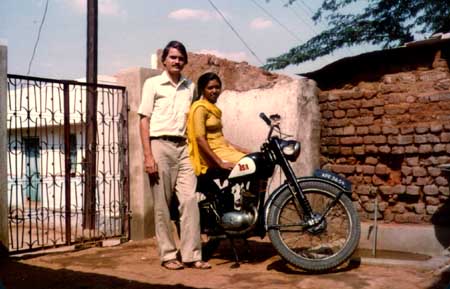
CHANDRA – It was probably several things. One of them was definitely that he said that he would encourage my musical profession. My community is rather conservative and all the other potential matches said that I would have to quit singing. Another reason is that my parents were happy with the prospects of sending me abroad to live. People in India have the idea that everyone in the US is rich and life is so easy there. You know the usual story. Another factor which played a part in my parents acceptance was the common religion.
TWAIN – So how long have you and David been married?
CHANDRA – 18 years last November. And we have two children, one boy and one girl.
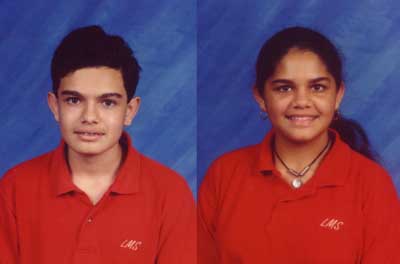
TWAIN – Well I want to thank you for sharing your experiences with us. You have been most open.
CHANDRA – It is my pleasure. I think that you have a good magazine there.
TWAIN – Thank you.
